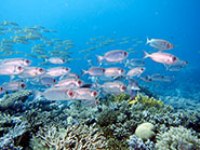Aug 30 2013
The best real estate for coral reefs over the coming decades will no longer be around the equator but in the sub-tropics, new research from the University of Bristol suggests.
 The researchers found that warming impacts were dominant, with a significant decline in suitability for corals near the equator. Image by Dr Elena Couce
The researchers found that warming impacts were dominant, with a significant decline in suitability for corals near the equator. Image by Dr Elena Couce
Fossil fuel emissions are impacting corals through high temperatures which can cause their deaths and ocean acidification which makes it difficult for them to produce their skeletons. In a study published today in Global Change Biology, Dr Elena Couce, Professor Andy Ridgwell and Dr Erica Hendy used computer models to predict future shifts in the global distribution of coral reef ecosystems under these two stressors.
The researchers found that warming impacts were dominant, with a significant decline in suitability for corals near the equator.
Dr Couce said: "Just as we have to take into account many factors when deciding where to live and juggle the trade-offs such as proximity to a city centre or the desire for a garden, whether a coral reef can establish or not depends on conflicting stressors. Global warming is stronger at the equator and drives corals away into higher latitudes, whereas acidification is stronger close to the poles and pushes coral habitat towards the equator."
Dr Hendy said: "We also found that some areas where conditions are currently borderline for corals, such as the eastern Pacific Ocean, could remain as they are or even become more suitable. This was unexpected and has important implications for coral management, as it suggests that these areas are not necessarily a ‘lost cause’."
Coral reefs are very sensitive to future changes. They are also very important to life in the oceans, with the highest biodiversity of all marine ecosystems.
Dr Couce continued: "By 2070 we predict that the Western Pacific, including the area known as the ‘Coral Triangle’, the bridge between Asia and Australia, will become much less suitable for corals. This is concerning because the Coral Triangle is a biodiversity hotspot containing over 70 per cent of known coral species. Conditions in the Great Barrier Reef in Australia will also get worse, although less rapidly, since it is farther away from the equator."
Professor Ridgwell added: "Suitability for corals gets better at the limits of the current coral reef distribution. But a possible move into higher latitudes will also be difficult. Range expansion is constrained by availability of shallow water areas with adequate light penetration for coral larvae to settle and form new reefs."